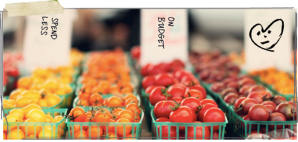02 Feb Meat Free Monday
Help our beautiful planet
According to the Food and Agriculture Organization of the United Nations (FAO), the livestock sector is “one of the top two or three most significant contributors to the most serious environmental problems, at every scale from local to global”. The FAO estimates that livestock production is responsible for 14.5 per cent of global greenhouse gas emissions, while other organisations have estimated it could be as much as 51 per cent. World scientists on the UN Intergovernmental Panel on Climate Change (IPCC) agree that we need to reduce the amount of greenhouse gases in the atmosphere by 80 per cent by 2050 in order to avoid catastrophic climate change.
Be healthy and happy
Many of the world’s leading health organisations now encourage a reduction in the amount of meat people consume. The World Cancer Research Fund recommends we “choose mostly plant foods, limit red meat and avoid processed meat”. In 2010, a study carried out by Oxford University’s department of public health found that eating meat no more than three times a week could prevent 31,000 deaths from heart disease, 9,000 deaths from cancer and 5,000 deaths from stroke, as well as save the NHS £1.2 billion in costs each year. Former chief scientific officer Sir Liam Donaldson has said that reducing the UK’s consumption of animal products by 30 per cent [by 2030] would prevent 18,000 premature deaths every year.
Save the pennies
According to Office for National Statistics figures for 2009, the average UK family spends £13.10 a week on meat and fish, with £3.70 and £3 being spent on fresh vegetables and fresh fruit respectively. The cost of meat has risen 10 per cent since 2007, yet most of the staples of a meat-free diet are comparatively cheaper: plant proteins such as dried beans or lentils typically cost less than the equivalent amount of animal protein. In fact, most of the world’s people eat a mostly meat-free diet made up of inexpensive commodities such as beans, rice and corn. Eat less meat + more veg = save money!
Think of the animals
Billions of animals are farmed and killed for meat each year. Most of them are raised in intensive factory farms, in cramped, overcrowded cages, sheds and pens. With no room to stretch limbs or wings and no access to daylight or fresh air, intensively reared animals are often diseased, injured and dying due to the unnatural conditions they are kept in. Farmed animals are subjected to mutilations such as having their beaks clipped, their teeth pulled out and their tails docked to stop them from pecking and wounding each other through boredom and frustration. All farmed animals end their lives with a brutal death at the slaughterhouse. Eating less meat is a compassionate step that helps prevent cruelty and suffering.
Source: Meat Free Monday




